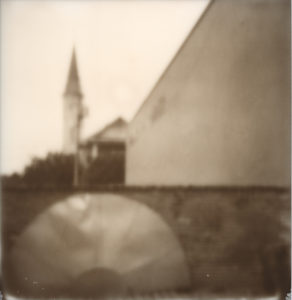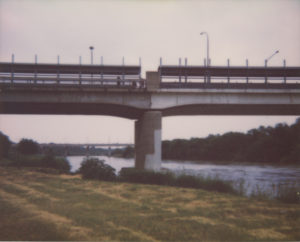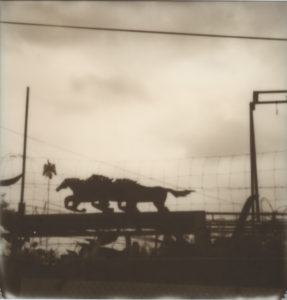
Susan Mikula captures America at its fringes
July 25, 2019 by Susan Reed Brown
 Ask Susan Mikula how she happened to be in Laredo, Texas, a border town across the Rio Grande from the Mexican city of Nuevo Laredo, and she’ll tell you a story that might seem at odds with today’s rancor over border control. The geography in that part of Texas is more associated with ranchers and long-horned cattle than her soft-focus photography, but a curator who saw Mikula’s work in a Miami exhibit recommended her to a U.S. State Dept. program that showcases American artists in projects destined for embassies and consulates around the world.
Ask Susan Mikula how she happened to be in Laredo, Texas, a border town across the Rio Grande from the Mexican city of Nuevo Laredo, and she’ll tell you a story that might seem at odds with today’s rancor over border control. The geography in that part of Texas is more associated with ranchers and long-horned cattle than her soft-focus photography, but a curator who saw Mikula’s work in a Miami exhibit recommended her to a U.S. State Dept. program that showcases American artists in projects destined for embassies and consulates around the world.
Mikula, who has a house in Provincetown with her partner, MSNBC anchor Rachel Maddow, and loves to travel, is unabashed in her enthusiasm for the diversity that is the United States. “I love America — I love all parts of America,” she says. “I’ve worked in some difficult places, like Camden, N.J., now so gutted where there used to be great industry.” Laredo is similar in its scrappiness, but “beautiful in its own way,” she says, and it was a good fit as subject matter for her photographs. It shares with much of the Southwest a forlorn, cinematic look. Think of Cormac McCarthy stories, or films such as “Paris, Texas.”
Mikula is calling the suite of images she took “The Laredo Commission: On the Cruising Cloud—/The Interdicted Land,” and they’re part of a group show that’s opening this Friday at Rice Polak Gallery in Provincetown. The title comes from an Emily Dickinson poem; the term “interdicted” means prohibited or intercepted and often refers to smuggled goods and people. “It’s a good reference point for what’s happening to us at the border,” Mikula says, her words punctuated by darting sparrows at a popular picnic spot overlooking Provincetown Harbor.
 One of the photographs shows the bridge separating Laredo from Nuevo Laredo, its midpoint painted a different color. Given the source of the project’s support, was she expected to steer clear of fractious political issues? “Because I am interested in politics, in everything I do it comes into play,” Mikula says. “I had free rein, and was allowed a driver” — she chose a poet friend, Jill McDonough. It was, she adds, “an enormous help in keeping cameras and film cool in the vehicle. For an artist, the timing was fortuitous.”
One of the photographs shows the bridge separating Laredo from Nuevo Laredo, its midpoint painted a different color. Given the source of the project’s support, was she expected to steer clear of fractious political issues? “Because I am interested in politics, in everything I do it comes into play,” Mikula says. “I had free rein, and was allowed a driver” — she chose a poet friend, Jill McDonough. It was, she adds, “an enormous help in keeping cameras and film cool in the vehicle. For an artist, the timing was fortuitous.”
Mikula’s studio practice involves reclaiming what others commonly overlook as salvage and scrap, such as expired Polaroid film, which leaves a greenish sepia cast on her images, and old cameras that she retrofits to her specifications. She cites photographer Walker Evans, who hunted down graffiti in abandoned spaces, as one of her influences.
Each assignment Mikula takes involves months of preparation. But elements of chance also play a role. “I do my reading, look at Google Earth to see the terrain, so I arrive with things in my mind of what I want to see. But that doesn’t always pan out,” she says. “And it’s often the thing I didn’t know existed that I like the best.”
She now prints images on mulberry paper, made by a centuries-old Japanese company, which behaves the way watercolor paper would, with pigment soaking into it. She treasures vintage Polaroid cameras for their idiosyncrasies — the original Polaroid Corporation, which shut down in 2001, focused on producing and selling film and outsourced the manufacture of its cameras. She also makes her own pinhole cameras.
 “Traveling to Laredo, I brought cameras that are 40 to 50 years old, and they all have quirks,” Mikula says. She is drawn to quirks. The focal points on some of the Laredo commission pictures are rusted cutouts in a junkyard. Horses “gallop” across a suggested plain; a cowboy holds tight to a “bucking” bronco. Heat and stasis, and the loss of the Old West, are hauntingly expressed by the tonal characteristics of the expired film
“Traveling to Laredo, I brought cameras that are 40 to 50 years old, and they all have quirks,” Mikula says. She is drawn to quirks. The focal points on some of the Laredo commission pictures are rusted cutouts in a junkyard. Horses “gallop” across a suggested plain; a cowboy holds tight to a “bucking” bronco. Heat and stasis, and the loss of the Old West, are hauntingly expressed by the tonal characteristics of the expired film
“You take a million pictures,” Mikula says, breezes blowing through her silver gray hair. “I’m aiming to get the viewer closest to what I felt. Because I’m the picture-taker, you’re seeing things, literally and figuratively, though my lens. I want to represent that as truthfully as possible.”
